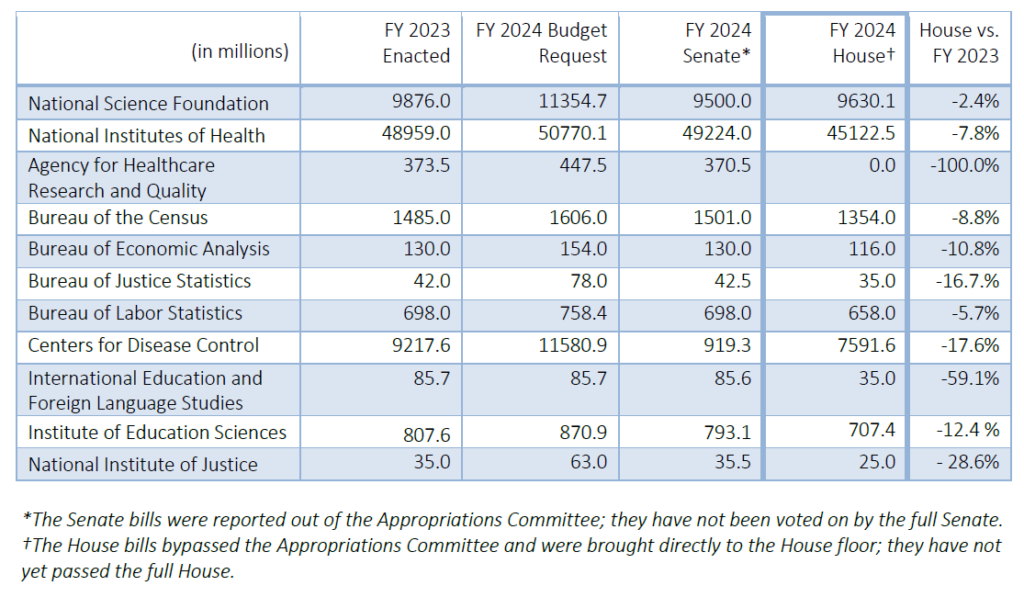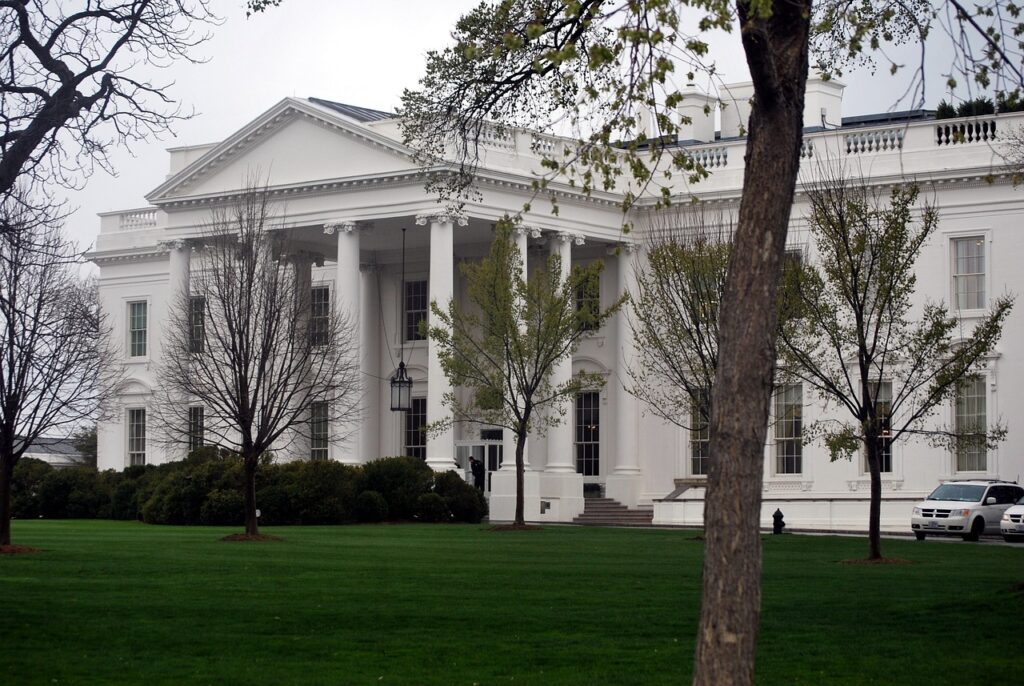Issue 23 (November 28)
Analysis of the FY 2024 House Appropriations Bills for Federal Science Agencies
In late October, details of the U.S. House of Representatives’ fiscal year (FY) 2024 appropriations bills were made public. Before leaving town for the Thanksgiving break, the House—under the leadership of newly-elected House Speaker Mike Johnson (R-LA)—took initial steps toward passing the bills. However, despite two days of debate, the Labor, Health and Human Services, Education (LHHS) appropriations bill—the measure that funds the National Institutes of Health, Department of Education, and several other agencies of interest to the science community—did not receive a final vote and consideration was punted until after the holiday. The other bill of interest—the Commerce, Justice, Science (CJS) appropriations bill, which funds the National Science Foundation, Department of Justice, and Census Bureau, among other agencies—did not manage to make it to the floor as House leadership had hoped prior to the break.
Up against another potential government shutdown on November 17, lawmakers managed to pass a second continuing resolution (CR) before leaving town. The stop-gap measure, orchestrated by Speaker Johnson, includes “tiered deadlines” for the unpassed spending bills. The deadline for the first tranche of bills (the Military Construction-VA, Agriculture, Energy-Water and Transportation-HUD bills) has been extended to January 19, 2024. The remaining bills (including LHHS and CJS) now have a deadline of February 2.
COSSA recently published a full analysis providing details of the House’s FY 2024 LHHS and CJS appropriations bills as introduced. Since neither bill has yet to be voted on by the full House, the numbers included below are subject to change through amendment.
Snapshot of the House Proposals for Federal Science Agencies, FY 2024

While averting a government shutdown over the holiday season is a positive development, pundits agree that the FY 2024 appropriations process will be in roughly the same spot come January, with hardline Republicans in the House seeking cuts beyond those already on the table (see table) and Senate Democrats looking to abide by the bipartisan budget deal struck earlier this year. Lawmakers do not appear any closer to an agreement on top-line spending levels, despite the fact that fiscal year 2024 officially began on October 1. Complicating things further, the President is scheduled to release his budget request for fiscal year 2025 as early as February, which typically would kick off the FY 2025 appropriations process in Congress; however, that could be delayed as a result of the Congress’s inaction on FY 2024.
Stay tuned to COSSA’s coverage for the latest developments.
Read on to review details on the House appropriations bill for FY 2024 for federal agencies and programs important to the social and behavioral science research community.
Advocacy Day Spotlight: Early Bird Registration Coming Soon

Early bird registration for COSSA’s tenth annual Social Science Advocacy Day will be opening soon! The event will be taking place April 8-9, 2024 in Washington, DC. Be sure to save the date, share with your colleagues, and keep an eye on your inbox for the latest details.
If your organization is interested in becoming a sponsor of Social Science Advocacy Day, learn more here.
Visit the COSSA website for the latest information on Social Science Advocacy Day.
NSF Signs Memorandum of Understanding with the Social Sciences and Humanities Research Council of Canada
On November 14, Dr. Sethuraman Panchanathan, Director of the National Science Foundation (NSF), signed a Memorandum of Understanding (MOU) with the Social Sciences and Humanities Research Council of Canada (SSHRC). The agreement is intended to foster a collaborative research partnership between the United States and Canada on various subjects including artificial intelligence (AI), healthcare, climate change, and more, through building on current projects and developing new opportunities. Some of these current projects include the NSF-led Global Centers, the NSERC-NSF AI/Quantum Lead Agency Opportunity, and the Canadian-led New Frontiers in Research Fund.
Stay tuned to COSSA for continued coverage.
Biden Administration Appoints New NCI Director
On November 17, the Biden Administration announced intent to appoint Dr. W. Kimryn Rathmell as Director of the National Cancer Institute (NCI). The position was previously held by Dr. Monica Bertagnolli, the recently confirmed Director of the National Institutes of Health (NIH) (see previous COSSA coverage). Dr. Rathmell currently serves as the Physician-in-Chief and Chair of the Department of Medicine at the Vanderbilt University Medical Center. She received her PhD in biophysics and her M.D. from Stanford University following a Bachelor of Science in biology and chemistry from the University of Iowa. Dr. Rathmell also served as an internal medicine resident, fellow in Medical Oncology, and postdoctoral researcher at the University of Pennsylvania, completed her post-doctoral training at the University of North Carolina at Chapel Hill, and received a Master of Management in Healthcare at Vanderbilt University. Dr. Rathmell is expected to begin her appointment in December.
OSTP to Address Climate Change and Environmental Injustice as Social Determinants of Health
The White House Office of Science and Technology Policy (OSTP) released The U.S. Playbook to Address Social Determinants of Health (SDOH) to address social and environmental impacts on public health. The Biden Administration recognizes that addressing public health needs requires a multidisciplinary approach and has expressed their commitment to doing so. SDOH addresses important issues such as housing and food security, education access, and a healthy environment. It recognizes three pillars as a starting point for addressing these topics, including improving data collection in health care, public health, social care services, and other data systems, providing funding to address social needs, and supporting organizations that provide relevant support to the outlined issues. The playbook is intended to be the starting point and the Administration is expected to continue developing solutions for this mission.
Stay tuned to COSSA for continued coverage.
White House Announces Initiative on Women’s Health Research
On November 13, the White House and First Lady Dr. Jill Biden announced a new initiative to advance women’s health research, recognizing gaps in funding for this research as a barrier to accessible healthcare for women. The Initiative on Women’s Health Research will be led by Dr. Biden and newly appointed Chair Dr. Carolyn Mazure, a previous National Institutes of Health (NIH) fellow and researcher at Yale University.
Dr. Biden highlighted the importance of the new initiative, stating that “there’s just not enough research yet on how to best manage and treat even common women’s health conditions…Our new White House Initiative on Women’s Health Research will help change that by identifying bold solutions to uncover the answers that every woman and her family deserves.”
The initiative is expected to foster collaboration across federal agencies and engage the scientific, private sector, and philanthropic communities to accomplish this goal. Further, the initiative is expected to provide actionable recommendations to the Biden Administration on priorities intended to advance women’s health research.


